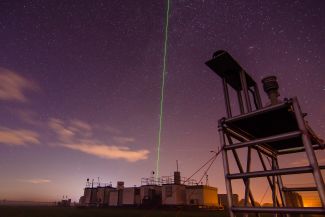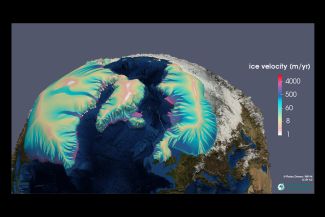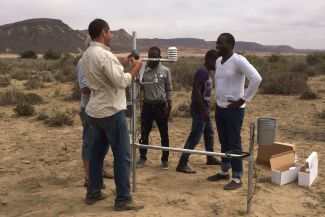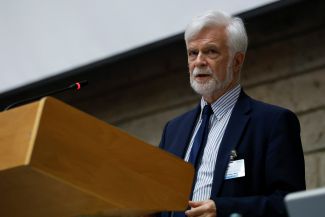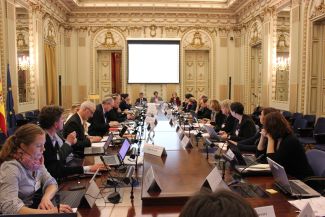Climate
Climate is changing faster and faster all over the world. Humans and their greenhouse gas emissions are responsible. With research and innovation, we are creating the knowledge and the necessary solutions for climate neutrality, adaptation and risk prevention.

Effectively addressing climate change
In line with the 2015 Paris Agreement, we have set ourselves ambitious climate targets: Germany is to achieve "greenhouse gas neutrality" by 2045. We want to massively strengthen resilience and adaptive capacity against negative impacts of climate change nationally and worldwide and sustainably direct financial flows towards mitigation of climate change and resilience. To achieve this, all areas of economic activity and daily life must change fundamentally in a very short time. This is a completely new challenge for governments, society and the economy. It can only be met through wise and comprehensive investments in research and innovation.
Through research, we can better understand the causes of climate change, identify risks and make forecasts. Research on climate change also shows us concrete ways and solutions on how to remove unavoidable greenhouse gas emissions from the atmosphere and take precautions against the impacts of climate change, such as heat waves and droughts, heavy rain or storms.
Research on climate change within the framework of FONA
With the FONA strategy "Research for Sustainability", the German Federal Ministry of Research, Technology and Space (BMFTR) funds research on climate change in a broad range. This ranges from the development of powerful climate models and scenarios to concrete risk management measures for cities and municipalities. It also develops innovative technologies and instruments for a climate-neutral economy and society. The BMFTR's research on climate change is excellent, innovative and relevant for practitioners and policymakers. In this way, BMFTR creates important knowledge and data bases for understanding climate change globally as well as regionally and for counteracting it in the sense of the common climate goals.
This research is important in order to be able to make responsible decisions towards sustainability. On the one hand, research questions need to align with actual needs, on the other hand, a rapid transfer of knowledge into the respective practical areas has to be ensured. To this end, research in FONA always involves stakeholders at the relevant levels. This applies to cities and municipalities or individual companies, to national and European policymakers as well as to international cooperation with developing and emerging countries and with other strong research nations.
The term research on climate change describes a comprehensive research portfolio in project funding: with active innovation policy, we create new solutions for mitigating climate change; our inter- and transdisciplinary adaptation research sets international standards; with pioneering programmes for in-depth natural science and socio-economic climate knowledge and world-leading research infrastructures, we create recognised international competitive advantages.
Thematic priorities of BMFTR climate research:
Climate neutrality by 2045
Europe wants to reduce its net greenhouse gas emissions to zero by the middle of the century and be the first continent to achieve a balance between man-made (anthropogenic) greenhouse gas emissions and the removal of such gases by sinks. Germany aims to achieve this goal by 2045. Research and innovation are essential for this. The BMFTR's programmes focus on where greenhouse gases in the sectors covered by the Climate Action Plan 2050 can be avoided or reduced on a large scale. Research also supports the regular review and updating of the Climate Action Plan 2050 as well as the revision of action programmes.
To this end, a comprehensive research and innovation package was anchored in the Climate Action Programme 2030 for the implementation of the Climate Action Plan 2050. Many of the measures are implemented within the framework of FONA.
Improve adaptability and risk management
Climate change already has widespread impacts on people, the environment and the economy, as was clearly demonstrated once again by the heavy rainfall events in western Germany in July 2021, for example. In addition to such extreme precipitation, heat waves, droughts or storms, as well as new health hazards via viruses and the habitat loss are further manifestations. Timely and science-based adaptation to climate change reduces or avoids damage and promotes risk management and resilience.
As part of the FONA strategy, the BMFTR supports the necessary measures for adaptation to climate change through cross-disciplinary thinking, new governance approaches and, last but not least, the improvement of data collection, information, calculation models and digital tools. The projects provide important contributions to the German Adaptation Strategy. The projects are worked on in close exchange with the stakeholders involved, taking into account their concerns. This creates a reliable basis for decision-making and perspectives for a prosperous and sustainable economy and way of life.
This approach to adaptation research in the FONA strategy is implemented both nationally and in international cooperation. The programmes and projects are connected within Europe and internationally and also promote capacity building in developing and emerging countries.
Basis for effective climate policy
Trend-setting programmes and globally recognized research infrastructures within the FONA Strategy contribute to enhancing climate knowledge. Climate system research tackles open questions regarding the understanding of processes and interactions within the climate system and regarding the influence of climate change on these. Sophisticated, high-resolution model simulations and the further development of climate scenarios as well as of climate policy instruments provide a basis for planning and decision-making in climate action and adaptation even for the regional or local level - increasingly so using artificial intelligence methods.
Horizon Europe
As part of the FONA strategy, the BMFTR is in close exchange with the EU Commission, the EU member states (via the programme committees), the European Institute of Innovation and Technology (EIT), and with strategically important partner countries via the joint programming initiative JPI Climate (Joint Programming Initiative "Connecting Climate Knowledge for Europe"). The BMFTR's representation in these bodies also enables the coordination of positions with important partners of this JPI and thus promotes joint research policy action. This approach also allows for a coordinated orientation and targeted international positioning of research within the framework of the FONA strategy and creates synergies in research policy at EU level.
Young researchers are regularly given the opportunity to pursue their own research ideas regarding global change by leading a research group on their own authority. With additional qualification offerings, the research group leaders are also prepared for possible future leadership roles in national and international research.
Currently, these junior research groups are funded to scientifically investigate the health impacts of climate change and environmental changes.
Last updated on













